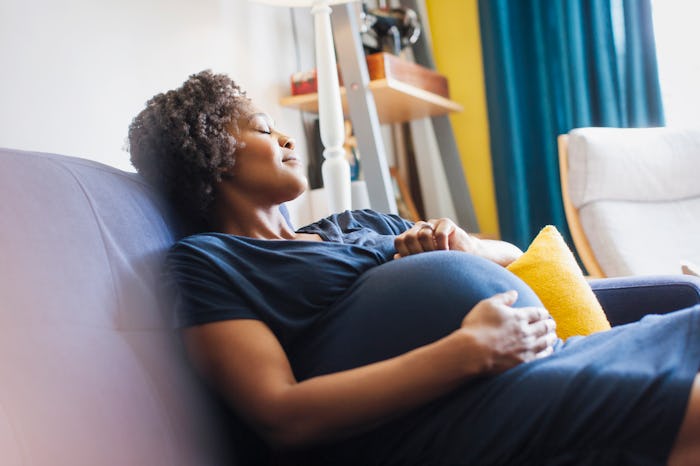Sleep

What You Need To Know About Taking Melatonin During Pregnancy
You’re not the only one who needs help sleeping.
I spent the good part of my second trimester sleeping upright in order to alleviate a persistent back pain. Turns out, my little one had nested in a spot just under my ribs, triggering a mid-back ache that hurt more when I lie down. I would have loved to earn more shut-eye during that time, but I also worried about how certain suggestions, like a Benadryl-induced slumber and even essential oils, might affect my growing baby. One friend said melatonin worked wonders for her erratic sleep habits, but she wasn't expecting. I wondered: Can you take melatonin while pregnant?
What does melatonin do?
“Melatonin is a naturally occurring hormone in your body,” Dr. Alan Lindemann, OB-GYN, tells Romper. “It is responsible for regulating sleep cycles. Your body produces more melatonin when it's dark, which contributes to your feeling sleepy at night.” As Greg Marchand MD, FACOG, FACS, OB-GYN explains to Romper, “extra melatonin can help you sleep by essentially convincing your body it's nighttime and time to sleep.”
Is melatonin safe to take during pregnancy?
“Studies show that melatonin is safe to take during pregnancy, but there are recommendations to take it for only short periods of time,” says Lindemann. “All high-quality studies I'm aware of have found up to 10mg of melatonin nightly to be safe and no credible studies have linked it to any birth defects,” adds Marchand.
What are some other ways to help get sleep during pregnancy?
Keeping your room’s temperature cool can be a big help, say around 65 degrees. If you’re waking up to soaked sheets and pajamas, try switching to a moisture-wicking fabric or another lightweight material for sleeping while you’re pregnant.
Try a cup of herbal tea, like chamomile, an hour or so before bed. Take it from me, you definitely don't want to drink it too close to bed or your pregnancy bladder will come a-knocking just as you start to doze.
Magnesium supplements might also do the trick, since the mineral is known to alleviate muscle pain, which — as it was in my case — may be the cause of your interrupted sleep as your belly continues to grow. Just check with your doctor about the correct dosage, since too much magnesium can cause diarrhea.
Of course, you may also want to try a nifty body pillow to ease discomfort while sleeping. Before pregnancy, I was determined to avoid bringing the rather large pillow in bed with me. But then all of a sudden, week 20ish rolled around and I couldn't snuggle up to it quick enough. I went with the elongated version, but you might also try the crowd-favorite U-shaped pillow. No matter the pillow you choose, experts suggest sleeping on your left side with knees and legs bent, and a pillow between them.
As for me, my back pain miraculously went away during my third trimester, but not before I added it to the list of things I will use as leverage during my daughter's teenage years, including "I wiped your butt" and "because I birthed you." It's the small things in motherhood, am I right?
Study referenced:
Braz J Psychiatry. “Melatonin use during pregnancy and lactation: A scoping review of human studies” Tya Vine, Gregory M Brown, Benicio N Frey. https://pubmed.ncbi.nlm.nih.gov/34730672/
Experts:
Dr. Alan Lindemann, OB-GYN
Greg Marchand MD, FACOG, FACS, OB-GYN
This article was originally published on